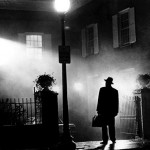 Via the Utne Reader:
Via the Utne Reader:
With a doctorate in astrophysics, Frank (not his real name) considers himself a man of science who relies on research and analysis to make sense of the world. Despite the occult overtones, his body’s violent reaction to the deliverance prayer struck him as an obvious case of cause and effect. He became convinced that he—like the poor souls he’d just read about—was infested with evil spirits.
After reading more books about demonic possession, Frank, a lapsed Catholic at the time, asked around for a priest who might be willing to exorcize him.
In a way Frank was fortunate. Exorcism is experiencing a renaissance in American Catholicism. There are more exorcists in the United States now than at any other time in modern history, according to experts. More than 100 bishops and priests met in Baltimore last November to recruit dozens more. So Frank didn’t have to look far to find Father Gary Thomas, a gregarious priest in Saratoga, California, a small city on the western slope of Silicon Valley…
Dormant for centuries at a time, exorcism tends to awaken when the church confronts significant crises, says Nancy Caciola, a history scholar at the University of California–San Diego. Portable manuals detailing ever more elaborate and standardized rituals of exorcism proliferated during the papal schism of the 15th century, when two men claimed to be the rightful pope. The manuals surfaced again during the Protestant Reformation.
The challenges now confronting the Catholic Church in the United States are legion: the sex abuse scandal, a secularizing society, and a restive flock that, studies show, loses one out of three adult Catholics, to name just a few. Exorcism reasserts the relevance of the church and its inimitable power over human destiny. Who else is going to help when the devil comes for you?
Pope John Paul II, who is rumored to have performed several exorcisms, frequently warned Catholics that Satan is very real and very dangerous. In a similar vein, Pope Benedict XVI praised a group of Italian exorcists in 2005, encouraging them to pursue their “important ministry.”
Good grief. Read the whole thing.

Well, I read the whole article. “Frank” had a one-hour consultation with a shrink, who determined in that amount of time that he wasn’t crazy. “Frank” also yawned during an exchange with a priest, which is apparently what the possessed do in such situations. Was “Frank” ever given a full physical to determine if that seizure he had while jogging had an organic cause? Like really bad acid reflux?
For the past six or seven years there’s been an popular tv show running on some cable station called “Supernatural,” involving two brothers who rove about the U.S. seeking out demons, exorcising demons, battling demons, and, on occasion, getting possessed by demons. And, coincidentally, during the same period of time there’s been a rise in the number of people who’ve decided they’re possessed by demons. Cause or effect?
From the source article: “But possession could, in a way, make it into an upcoming edition of the Diagnostic and Statistical Manual of Mental Disorders, according to Roberto Lewis-Fernandez, who is part of a team updating the manual.”
And, before you know it the drug companies will be on board. Exorcism in a medicine bottle: the most expensive sugar pills you’ll ever buy. Because, we all know that exorcism is one big placebo.
I suppose they could call the anti-possession pill Demonoff.
Another shocking expose that I would file away under the heading of “Religion Believes What It Says.” Other stories under this heading are: “Muslims Believe Muhammad was God’s Prophet,” “Jews Circumcise Male Infants,” “Anglicans Are Really Closet Agnostics Who Like To Talk About Religion,” and “Hindus Like Cows.” The New Testament is full of stories about demonic activity. If one takes the New Testament to be the Word of God, then one will believe in demonic activity in the world. And if one believes in Jesus, who in the New Testament tells his believers to cast out demons, then one will believe in exorcism.
Now, those beliefs might be wrong, but given the premise, aren’t unreasonable.
Mark in Spokane, Christianity has (as you know!) evolved in many different ways over the years. You may choose to believe that belief in Jesus comes with a belief in the sorts of ritual described in that article, but I am certain that there are many Christians who would, to put it mildly, disagree.
Comparing the different beliefs that exist *within* Christianity can be as useful-and revealing–an exercise as constrasting Christianity with other faiths or, indeed, the absence of faith.
Mr. Stuttaford,
True enough — and I tried to qualify my answer to take that into account. There are many Christian sub-traditions that don’t believe that the Bible is a reliable or authoritative guide to religion, others that are fundamentalistic in their approach to the Bible, others that take a middle-approach, etc. I tried to make that distinction when I said that “if one takes the New Testament to be the word of God.” There are Christians who don’t — who view it merely as a collection of myths, legends, histories, etc., with no divine input. Catholicism does affirm the New Testament to be the word of God, although written in the words of human beings. As such, its affirmation of the reality of demonic activity isn’t surprising. And, as I pointed out in my post, if one accepts that premise (a big if, granted), then it isn’t an unreasonable view.
But that said, you are absolutely correct that there are many different traditions broadly described as “Christian” — many of which (like Anglicanism and Mormonism) don’t fit within the orthodox stream of that faith.
Cheers!